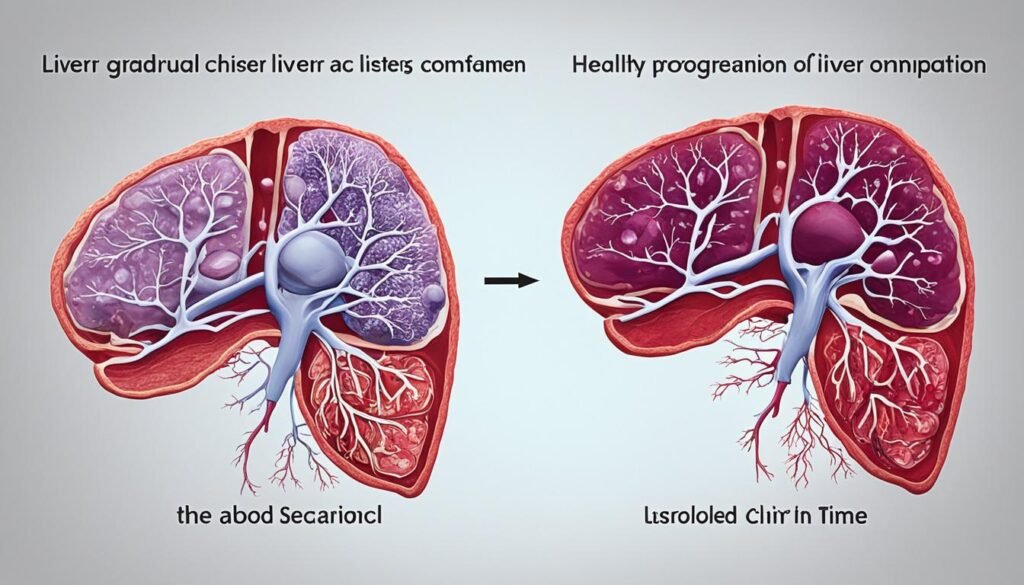The journey through life often presents a myriad of choices, including decisions about alcohol consumption. Unraveling the effects of alcohol on the body is crucial, particularly as it pertains to long-term alcohol consumption. Over several decades, the body bears the burden of our choices, making it essential to understand the health consequences of chronic drinking. This article delves into the far-reaching effects that 40 years of steady drinking can have on a person’s well-being. From the toll taken on the liver to the cognitive impairments that may ensue, it’s important to see the full picture emerging from extensive research and medical insights.
South Africa faces its unique challenges when it comes to managing alcohol consumption. Understanding these effects is vital for creating awareness and encouraging healthier lifestyles amidst the rich and diverse culture of this vibrant country.
Key Takeaways
- Recognizing the comprehensive effects of alcohol on the body is necessary for personal health.
- Chronic drinking over decades can lead to systematic and severe health consequences.
- Understanding the damaging impact that long-term alcohol consumption has is vital for prevention and education.
- Examining the severe health implications of alcohol can guide better decision-making in relation to drinking habits.
- Creating awareness in South Africa regarding the pitfalls of prolonged alcohol use is key to promoting community health and safety.
Chronic Drinking and the Aging Process
The consequences of habitual alcohol consumption can extend significantly into an individual’s later years, exacerbating the natural decline that comes with aging. As individuals advance in age, the impact of alcohol abuse on health escalates and becomes more apparent, highlighting the dangers of long-term alcohol use. One sobering aspect of this impact is on bone health—older adults, particularly those with a history of alcohol misuse, find that their bones may not be as robust as they once were.
This weakening of bone structure leads to a heightened risk of injury. Significant injuries such as hip fractures become more common, which, in the elderly, could lead to a decline in independence and quality of life. Beyond the physical harm, the effects of alcohol on the body extend to cognitive health, often leading to conditions that mimic the symptoms of dementia. Indeed, the cognitive impairments associated with excessive drinking could be mistakenly attributed to Alzheimer’s or other forms of age-related cognitive decline.
Moreover, alcohol’s analgesic dulling effect on the body can mask the signs of serious health issues, such as heart attacks, which increases the danger as individuals may delay seeking prompt medical attention. The table below aptly showcases the relationship between chronic drinking and its effects on aging individuals:
| Aspect of Health | Impact of Alcohol Abuse |
|---|---|
| Bone Density | Heightened risk of fractures and osteoporosis |
| Cognitive Function | Memory lapses, impaired judgement, and potential misdiagnosis of dementia |
| Cardiovascular Health | Obscured symptoms of critical conditions, increased blood pressure |
As the table illustrates, the impact of alcohol abuse on health is multifaceted, particularly in the context of aging. With a growing awareness of the extensive dangers of long-term alcohol use, it is increasingly imperative to foster earlier intervention strategies and support for those struggling with substance abuse. Such measures could considerably improve the health outcomes of the older population, emphasizing the critical necessity of addressing chronic drinking behaviors before they compound the inevitable effects of the aging process.
What does 40 years of drinking do to your body?
The landscape of human health is profoundly altered by the long-term effects of alcohol consumption, impacting virtually every organ system. Beyond the immediate, often enjoyable effects of alcohol, lies a potential trail of destruction that spans decades for heavy drinkers, notably manifesting in a spectrum of alcohol-related health problems.
Alcohol’s Impact on Vital Organs
Years of ethanol exposure can lead to considerable liver damage, including a high probability of hepatic cirrhosis and liver cancer. However, the liver isn’t alone in its plight; the pancreas and heart also bear the brunt of alcohol’s aggressive nature. The steady rise in blood pressure and cholesterol due to alcohol’s influence imposes a silent threat of stroke and heart disease, while the suppressed immune system leaves the body less capable of fending off invaders.
The body’s capacity to handle the toxic effects of alcohol diminishes over time, often leading to irreversible organ damage and a host of chronic conditions.
Psychological and Cognitive Consequences
Chronic exposure to alcohol doesn’t just scar the body, it entrenches itself deeply within the psyche, triggering various mood disorders and bouts of depression. Continuous alcohol intake wrestles with the brain’s chemistry, leading to cognitive impairments due to alcohol. These impairments may present as a decreased ability to make decisions or slower reaction times, further compounding the risks of everyday activities.
Increased Risk of Chronic Diseases
With health risks of excessive alcohol consumption such as heightened cancer risks related to alcohol, the body’s narrative changes from acute episodes to drawn-out battles with diseases. Noteworthy is alcohol’s role in various cancers, including those of the breast, bowels, and oral cavity, indicating a grim overlap between lifestyle choices and carcinogenesis.
| Organ/Disease | Effect of 40 Years of Drinking | Health Outcome |
|---|---|---|
| Liver | Cirrhosis, Liver Cancer | Potential Liver Failure |
| Heart | Increased Blood Pressure and Cholesterol | Raised Risk of Heart Attack and Stroke |
| Brain | Cognitive Decline, Mood Disorders | Impaired Mental Function, Depression |
| Pancreas | Pancreatitis | Chronic Pancreatic Inflammation |
| Immune System | Compromised Defenses | Higher Susceptibility to Infections |
| Cancer | Increased Risk | Higher Probability of Various Cancers |
In conclusion, the long-term effects of alcohol consumption are a clear and present danger to overall well-being, highlighting the need for caution in our relationship with alcohol. As continued research unravels more connections between lifestyle habits and health outcomes, emphasizing preventive measures and moderation becomes vital.
Understanding Alcohol-Related Health Problems

The cascade of chronic health issues due to alcohol spans across immediate physiological changes to long-standing bodily harm. The impact of 40 years of drinking on your body can manifest through various symptoms and complications, many of which may go unnoticed until the later, more serious stages. Below is a comprehensive examination of the health complications associated with prolonged alcohol consumption.
Binge drinking and regular high-volume consumption can rapidly induce heart rate acceleration and vessel expansion. These acute responses, though sometimes transient, can lead to potentially hazardous situations, particularly for those with underlying cardiovascular conditions. Over an extended period, the body’s reaction grows more severe, with toxicity accumulating and systemic damage commencing.
Notably, the impact of 40 years of drinking on your body extends far beyond the initial effects. Chronic health issues due to alcohol weave a complex web, intertwining physical ailments with social and emotional distress. The overview below serves to underline the breadth of these alcohol-related health complications:
- Inebriation leading to impaired judgement and coordination
- Dehydration and subsequent digestive disturbances
- Progressive liver and other organ damage
- Increased injury risk due to diminished reflexes and balance
- Negative impacts on personal and community well-being
| Immediate Effects | Cumulative Damage | Social Consequences |
|---|---|---|
| Dilated blood vessels | Liver disease | Isolation |
| Rapid heartbeat | Pancreatic dysfunction | Property loss |
| Dehydration | Cognitive decline | Increase in violence |
| Acute intoxication | Heightened injury risk | Strained relationships |
The impact of 40 years of drinking on your body is not a tale of minor scrapes and bruises but a serious saga of declining health and enhanced susceptibility to injury and illness. From the cellular level to community interactions, alcohol casts a long shadow. The long-term engagement with alcohol takes its toll, crystallizing the urgent need to address chronic health issues due to alcohol far more comprehensively.
Interaction Between Alcohol and Medications

The chronic consumption of alcohol carries substantial health consequences, particularly when combined with various medications. Understanding the complex dynamics between alcohol and drug interactions is crucial for safeguarding one’s health, as well as comprehending how medications and alcohol use interact to exacerbate pre-existing health conditions. Here we delve into the specifics of how prescribed drugs, over-the-counter medicines, and even herbal remedies can react adversely with alcohol.
Dangers of Mixing Alcohol with Prescription Drugs
The risks of alcohol and drug interactions are particularly dangerous when it comes to prescription medication. The dual ingestion of alcohol with drugs like aspirin or anticoagulants often leads to an increased likelihood of gastrointestinal bleeding, presenting serious health consequences. Sedatives and certain types of antidepressants are notorious for having their drowsy effects amplified, raising the risk of accidents or even fatal overdose.
Alcohol’s Effect on Over-the-Counter Medication Efficacy
When it comes to over-the-counter remedies, the interference of alcohol can be subtle yet equally harmful. Notably, medications containing acetaminophen, when taken with alcohol, can cause severe liver damage—a chronic health issue due to alcohol synergistically worsening the drug’s side effects. Additionally, while not requiring a prescription, these over-the-counter options should still be approached with caution as the health risks of excessive alcohol consumption are not mitigated simply because a medication is more readily available.
The Risks of Herbal Remedies and Alcohol Interaction
Counterintuitively, even natural products are not free from adverse interactions with alcohol. Herbal remedies and alcohol can combine to produce unexpected and hazardous side effects. For example, St. John’s Wort, commonly used for depression, can have its efficacy reduced if alcohol is consumed. This can lead to a return of depressive symptoms or further complicate the health consequences of chronic drinking. It is evident that vigilance with medications—herbal or otherwise—is paramount when alcohol is present in one’s lifestyle.
In summary, careful consideration is warranted for those navigating the complexities of consuming alcohol while taking various forms of medication. The chronic health issues due to alcohol are already burdensome; when coupled with potentially detrimental drug interactions, the stakes are even higher for sustaining long-term well-being.
Conclusion
The journey of life is influenced heavily by our choices, including the consumption of alcohol. Querying what does 40 years of drinking do to your body? opens a window into the profound and extended impact that alcohol can have on an individual. Long-term alcohol consumption weaves a complex web of chronic health issues due to alcohol, contributing to severe damage across vital organs like the liver, heart, and pancreas, and notably increasing cancer risks. The brain is no sanctuary from these effects, as psychological and cognitive functions take a significant hit, complicating existing mood disorders and embedding deep-rooted memory problems.
Navigating life after decades of alcohol use, one might face heightened risk in daily activities, resulting in a greater inclination towards traffic mishaps and personal injuries. The fallout from these incidents touches upon every aspect of one’s life, often straining and even breaking the fragile bonds of personal relationships. Moreover, with the advent and necessity of medications in later years, a critical understanding of the alcohol-related health problems that can manifest when mixed with prescription, over-the-counter, or herbal remedies becomes indispensable.
As we examine the long-term effects of alcohol consumption, it becomes ever more evident that moderation, or better yet, abstinence, is not merely a recommendation but a call to action for preserving health and life quality. Thus, in reflection of the myriad health risks associated with 40 years of alcohol consumption, we’re reminded that our wellness journey is marked by the choices we make today, and every step towards reducing alcohol intake is a step towards a healthier tomorrow.
